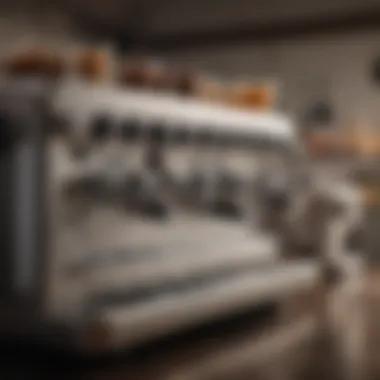Exploring Italian Coffee Machine Brands: A Comprehensive Overview


Intro
Italian coffee machines represent a blend of artistry and engineering, crucial in shaping the global coffee culture. The legacy of these machines is rooted in Italy's rich coffee history, where every espresso crafted tells a story of tradition and innovation. This article unveils the prominent Italian brands, revealing their distinctive qualities and the technological advancements that define them.
Understanding the landscape of Italian coffee machines is essential for anyone interested in elevating their coffee experience. From the historical context that birthed these brands to the nuanced features they offer today, this overview aims to illuminate the path toward selecting the perfect machine.
We will explore the following key points, offering insights that cater to both casual drinkers and coffee connoisseurs alike:
- Historical significance of Italian coffee machine brands.
- Major advancements in coffee brewing technology.
- Unique features of leading brands like Gaggia, Saeco, and Rancilio.
- User experiences and market positioning
As we delve deeper, coffee enthusiasts will come to appreciate the intricate craftsmanship that defines these Italian brands and the broader impact they have had on coffee brewing worldwide.
Intro to Italian Coffee Culture
Italian coffee culture is essential to understanding the country's rich traditions and innovation in coffee machine design. This culture reflects not only a way of drinking coffee but also a lifestyle. Countries around the world look to Italy when it comes to coffee preparation, presentation, and general appreciation. The practices that Italians follow have influenced how many enjoy coffee globally. By diving into this topic, we can appreciate both the artistry and the technical advancements that have occurred over the years.
Historical Overview
The history of coffee in Italy dates back to the 16th century. Initially, coffee was met with skepticism, viewed as a foreign beverage. However, with time, it intertwined with local customs. The first café, Caffè Florian, opened in Venice in 1720, setting a precedent for social coffee establishments across the country. The espresso machine, invented in the early 20th century, represented a turning point. It enabled café owners to create the rich and thick espresso that Italy is famous for today. This invention sparked a movement, leading to the proliferation of coffee machines designed to uphold and enhance the Italian coffee experience.
Today, the espresso machine symbolizes Italian craftsmanship. It represents not just technology, but also the cultural significance of coffee in Italy. The espresso's popularity has extended beyond Italy, cementing its status as a global icon of coffee.
The Social Aspect of Coffee in Italy
In Italy, coffee drinking is deeply social. Friends gather in bars, discussing life over a quick espresso or cappuccino. The ritual of coffee is unlike what you find in many other cultures; it encourages brief but meaningful connections. Morning coffee often signals the start of the day, while an afternoon espresso is a sign of relaxation. Coffee in Italy serves as a backdrop for daily interactions, making it an integral part of social life.
Italians tend to consume espresso quickly, often standing at the bar, which highlights efficiency and intimacy over indulgence. This tradition contrasts with more leisurely coffee-drinking cultures. The Italian coffee scene has, therefore, fostered a unique social dynamic, making coffee not just a drink, but a vehicle for community and connection.
In summary, understanding Italian coffee culture provides insight into the heart of Italy. It reveals historical significance and showcases the remarkable social practices tied to coffee. This culture is at the core of Italian coffee machine brands, driving their design and innovation to meet both tradition and the needs of modern consumers.
Defining Italian Coffee Machines
Understanding Italian coffee machines is pivotal in this article as it provides a framework for appreciating the diverse brewing tools that are integral to Italian coffee culture. Each type of machine carries its unique characteristics, defining coffee traditions while also reflecting advancements in technology and design. This section illuminates the various types of machines and key features that distinguish Italian craftsmanship in the coffee-making industry.
Types of Italian Coffee Machines
Espresso Machines
Espresso machines are at the core of Italian coffee culture. They enable users to create a concentrated coffee shot with rich flavor. The key characteristic of espresso machines lies in their ability to brew coffee under high pressure, usually around 9 bars. This high-pressure brewing is beneficial because it extracts oils and flavor compounds from coffee grounds effectively, producing a rich and creamy espresso.
A unique feature of espresso machines is the inclusion of steam wands which froth milk for making beverages such as cappuccinos and lattes. However, these machines can come with a steep learning curve. Users may need practice to master the technique of pulling shots and frothing milk properly.
Traditional Moka Pot
The Moka pot offers a distinct way to brew coffee and is an iconic Italian appliance. Its contribution to coffee culture lies in its brewing method, which uses steam pressure to force water through coffee grounds. The key characteristic of a Moka pot is its compact design which makes it easy to use at home. This option is popular among those who enjoy strong coffee without the need for electricity.
A unique feature of the Moka pot is its ability to produce a coffee that is rich in flavor and aroma, similar to espresso but with a slightly different profile. On the downside, it may not have the same level of control over brewing variables as an espresso machine.
Single Serve Machines
Single serve machines have revolutionized the way people enjoy coffee, providing convenience and speed. These machines utilize pre-packaged coffee pods, which offer a consistent brew with minimal effort. The key characteristics of single serve machines are their user-friendliness and adaptability for various coffee styles.
A significant advantage of single serve machines is their ability to brew different types of coffee, from espresso to flavored coffee, all at the press of a button. However, the environmental impact of disposable pods can be a drawback, as well as the potential cost of purchasing coffee pods over time.
Key Features of Italian Coffee Machines
Material Quality
Material quality in Italian coffee machines plays a crucial role in durability and performance. High-quality materials such as stainless steel or brass are often utilized in construction. This choice is beneficial as it not only enhances the aesthetic appeal but also the longevity of the machine.
A unique feature of superior material quality is its ability to withstand heat and pressure, which is essential for brewing optimal coffee. Low-quality materials, on the other hand, may not provide the desired brewing consistency or could lead to machine breakdowns over time.


Brewing Technology
Brewing technology has evolved significantly in Italian coffee machines. Advanced systems ensure consistent temperature and pressure during the brewing process. The sophisticated features, such as PID temperature control, allow users precise control over brewing conditions, which is beneficial for maintaining flavor profile.
However, some of these technologies can make machines more expensive and complex, which may deter novice users who prefer simplicity in their brewing process.
Design Aesthetics
Design aesthetics are a hallmark of Italian coffee machines. Many brands emphasize visual appeal, marrying functionality with style. This characteristic is beneficial not only to enhance kitchen decor but also to provide an experience that complements the ritual of coffee making.
A unique feature in design is often the use of elegant lines and colors that reflect Italian artistic traditions. However, some users may regard an emphasis on aesthetics as secondary to functionality, particularly if it leads to higher costs without clear performance benefits.
"Italian coffee machines are more than just appliances; they are an embodiment of culture, technology, and artistry that influences coffee brewing around the world."
By examining the types and features of Italian coffee machines, readers can appreciate the intricacies involved in crafting an exceptional coffee experience.
Notable Italian Coffee Machine Brands
The realm of Italian coffee machine brands reveals a rich tapestry of craftsmanship, innovation, and cultural importance. Each brand not only contributes unique machines but also embodies the evolution of coffee brewing as an art and science. Understanding these brands allows enthusiasts to appreciate the depth of Italian coffee heritage while making informed decisions about their brewing tools. This section examines several leading brands, focusing on what makes each distinct and their impact on coffee culture.
La Marzocco
Brand History
La Marzocco was founded in 1927 in Florence. It has gained a reputation for quality and innovation. The company pioneered various technologies that have become standards in the industry. One of its key characteristics is the dual boiler system, which allows for optimal extraction of espresso. This feature offers both temperature stability and steam pressure for milk frothing, making La Marzocco a popular choice among baristas and coffee shops.
Product Range
La Marzocco provides a variety of machines, catering to both home users and commercial establishments. The range includes models like the Linea Mini and the GS3, each known for its durability and performance. The unique feature lies in their hand-crafted design, which combines aesthetics with functionality. While they may come with a higher price tag, the investment often yields a higher return in terms of longevity and coffee quality.
User Experience
Users often rave about the consistency and quality of coffee produced by La Marzocco machines. The blend of traditional brewing methods with modern technology ensures an exceptional brewing experience. A significant advantage is the machine's user-friendly interface, making it accessible for both beginners and experienced users. However, some may find the learning curve steep due to the level of control these machines offer.
Rocket Espresso
Brand Philosophy
Rocket Espresso embodies the philosophy of combining classic design with modern technology. Their approach focuses on craftsmanship and high-quality materials. This dedication results in machines that not only look good but also achieve premium coffee extraction. This philosophy appeals to coffee aficionados who value both aesthetics and performance.
Technological Innovations
Rocket Espresso has integrated innovative features such as E61 group heads, which ensure temperature stability during brewing. This stability is crucial for achieving the desired flavor profile in espresso. Their emphasis on precision engineering makes them a reliable choice for serious coffee drinkers. However, some users find that the intricate design may require more maintenance.
Community Recognition
Within the coffee community, Rocket Espresso enjoys significant acclaim. Baristas praise their machines for reliability in high-pressure environments. The community’s recognition also highlights their commitment to customer support and education. This enhances user experience and fosters brand loyalty. Despite the competitive market, Rocket maintains a strong standing among peers.
Gaggia
Legacy and Impact
Since 1938, Gaggia has played a pivotal role in the development of espresso machines. Known for its classic lever machines, Gaggia's impact on home and commercial espresso preparation is well-documented. Gaggia machines introduced the concept of creating espresso under pressure and helped shape the future of coffee making. This legacy resonates with coffee enthusiasts who appreciate historical significance alongside modern utility.
Signature Products
Gaggia’s lineup includes iconic models like the Gaggia Classic, which is favored for its solid build and reliability. These machines are often recommended for home users seeking quality espresso within a reasonable price bracket. Signature products reflect Gaggia's commitment to both performance and accessibility. The primary downside might be their aesthetic, which some users find less modern compared to newer brands.
Market Position
Gaggia is well-positioned as a bridge between professional and home users. Their machines strike a balance between cost and quality, attracting a broad audience. By catering to both markets, they maintain a competitive edge over other brands. As a result, Gaggia's machines are considered a staple in many kitchens worldwide.
illy


Brand Fundamentals
illy, founded in 1933, is known primarily for its high-quality coffee rather than just machines. Its emphasis on coffee blends complements its line of coffee makers. The brand is synonymous with espresso excellence, creating a solid reputation for quality. This focus on product integrity makes illy a trusted name in coffee.
Coffee Quality
illy places a strong emphasis on sourcing high-quality beans. Their blends are carefully crafted to achieve a distinct flavor profile recognized globally. This dedication to coffee quality enhances the value of their machines, as they are designed to produce the best possible brew. However, some may notice a higher price point associated with illy products, reflecting the quality of their offerings.
Global Reach
As a brand that operates internationally, illy has established a strong foothold in many markets. Their machines and coffee products are available worldwide, making them a household name among coffee lovers. The global reach aids brand recognition but requires continuous adaptation to different markets. This adaptability contributes to illy's ongoing success.
Breville
Integration of Technology
Breville stands out for its focus on technological integration. Their machines often feature digital interfaces and automated processes that simplify brewing. Such innovations allow for flexibility and consistency in preparation. This emphasis on technology caters to both novice and seasoned coffee enthusiasts.
Design Philosophy
The design philosophy of Breville merges functionality with aesthetic appeal. Their machines often reflect a modern, sleek design that fits well in any kitchen. This balance of style and usability appeals to a broad audience, ensuring that Breville remains a popular choice in home brewing.
Consumer Satisfaction
Breville machines generally receive positive consumer feedback due to their ease of use and effective performance. Many users appreciate the reliable results they can achieve with minimal effort. However, the more complex models might not be suitable for everyone, particularly those who prefer manual brewing methods.
Evaluating Espresso Quality
In the realm of Italian coffee, evaluating espresso quality holds paramount importance. Espresso is not just a drink; it is an experience that combines the art of brewing with the science of flavor extraction. Assessing the quality of espresso requires attention to several critical elements. Firstly, the taste and aroma of espresso can reveal much about the brewing process. Secondly, understanding these factors helps consumers appreciate their coffee in a deeper way. Ultimately, a well-executed espresso reflects the skill of the barista and the quality of the machine used, highlighting why this examination is essential.
Factors Influencing Espresso Taste
Bean Selection
Bean selection is a fundamental part of creating excellent espresso. The type of beans used impacts flavor profiles and overall quality. For instance, Arabica beans are known for their sweetness and acidity, making them a popular choice. In contrast, Robusta beans tend to offer a stronger, more bitter taste. Therefore, when choosing beans, knowing your preferences can guide the selection process.
With a diverse range of beans available, sourcing high-quality options from reputable suppliers can significantly enhance the espresso experience. This focus on quality allows individuals to explore various flavors and aromas, presenting a unique drinking experience.
Grind Size
Grind size directly impacts the extraction process and therefore the final taste of the espresso. A finer grind brings out more flavors from the coffee, while a coarser grind can lead to under-extraction, resulting in a weak beverage. The key characteristic of grind size is its influence on brewing time; a finer grind requires less time to extract flavors than a coarser one.
Understanding the right grind size for specific beans and brewing methods is critical. A major benefit of adjusting grind size is the ability to customize the espresso flavor according to personal taste. However, inconsistency in grind size can lead to uneven extraction, compromising the quality of the beverage.
Brewing Pressure
Brewing pressure is another influential factor in espresso quality. Espresso machines typically use a pressure of around 9 bars during extraction. This pressure is key to forcing water through the packed coffee grounds effectively. Higher pressure can result in over-extraction, leading to bitter flavors, while insufficient pressure yields a sour taste.
Brewing pressure determines how oils and solids from the coffee are extracted. Hence, maintaining the correct pressure is essential in achieving a balanced flavor profile. Many quality machines offer adjustable brewing pressure, giving users the ability to refine their espresso.
User Reviews and Performance
User reviews play a significant role in assessing espresso machine performance. Feedback from consumers provides insights into reliability and functionality. Evaluating reviews can guide potential buyers in their decision-making process. Users often discuss their experiences with different brands, detailing the strengths and weaknesses of each model.
Product performance is measured not just on the quality of espresso produced but also on ease of use, maintenance, and durability. Many coffee enthusiasts share tips and tricks for maintaining their machines, which is invaluable information for new users.
Maintenance and Care of Coffee Machines
Maintaining and caring for coffee machines is crucial for lasting performance and optimal coffee quality. These machines represent significant investments for enthusiasts and professional baristas alike. Regular maintenance ensures that the machines continue to perform efficiently, preserving the flavor integrity of the coffee. Additionally, proper care can extend the lifespan of the equipment, making it a wise practice for anyone passionate about coffee brewing.
Essential Cleaning Practices
Daily Maintenance


Daily maintenance is fundamental to the longevity of coffee machines. This practice involves simple yet effective actions that prevent buildup from coffee oils and residue. One key characteristic of daily maintenance is cleanliness. A clean machine helps in brewing better tasting coffee. Additionally, it is a good choice as it only requires a few minutes each day and can greatly impact flavor and performance.
Some unique aspects of daily maintenance include:
- Rinsing the portafilter and baskets immediately after use. This helps to remove grounds and oils.
- Cleaning the drip tray and water reservoir regularly. Keeping these parts clean prevents any mold or contamination in the water used for brewing.
The advantages of daily maintenance are clear. It promotes consistent flavor quality and enhances the overall brewing experience. Neglecting this aspect, however, could lead to poor tastes and possibly damage to the machine over time.
Deep Cleaning Protocols
Deep cleaning protocols are essential for comprehensive care and should be performed periodically. They involve thorough cleaning beyond daily maintenance. This practice contributes to optimal performance by removing any stubborn residue that builds up over time. A well-maintained machine performs better and can produce superior coffee.
One significant characteristic of deep cleaning is its in-depth nature. It often includes:
- Descaling to remove mineral buildup in the heating elements. This is critical in areas with hard water, where scale can affect performance.
- Filling and running a cleaning solution through the machine. This process ensures that all components, especially brewer heads, are free from buildup.
The advantages of implementing deep cleaning are substantial. This practice restores the machine's functionality and prolongs its life. However, it can be time-intensive and requires some additional supplies. Despite these requirements, the benefits often outweigh any inconvenience.
Troubleshooting Common Issues
Troubleshooting common issues is an integral part of caring for coffee machines. Understanding the potential problems that can arise, such as inconsistent brew temperature or leaks, contributes to the overall satisfaction with the machine.
Regular observation of performance can identify issues early, preventing more significant problems down the line. Users should familiarize themselves with common signs of malfunction, like strange noises or fault lights. Quick responses to these observations can save time and repair costs.
The Future of Italian Coffee Machines
The future landscape of Italian coffee machines is poised for significant transformation. As technology advances, the coffee machine industry is evolving to meet the changing preferences of consumers. With increasing awareness about quality, efficiency, and sustainability, this evolution is critical for both manufacturers and users. Understanding these trends helps enthusiasts and professionals alike appreciate the direction in which the coffee brewing experience is heading.
Emerging Technologies
As coffee lovers continue to desire a more personalized brewing experience, several emerging technologies are gaining traction. Smart coffee machines that can be controlled via smartphone apps allow users to optimize their brewing processes. These machines often have features like precise temperature control and customizable brewing times.
Additionally, the integration of artificial intelligence in coffee machines is noteworthy. AI can analyze user preferences and suggest optimal settings for various coffee types. Such advancements ensure that consumers can enjoy cafe-quality brews at home. Some brands are also exploring the use of IoT (Internet of Things) capabilities, connecting coffee machines to home automation systems for convenience.
Highlighting the benefits of these technologies:
- Customization: Users can tailor their coffee to suit individual tastes.
- Convenience: Smart machines provide easy access to settings and recipes.
- Quality: Advanced technology often leads to better extraction and taste.
Sustainability Considerations
Sustainable practices are at the forefront of discussions surrounding the future of Italian coffee machines. Manufacturers are increasingly concerned about their environmental impact and are looking for ways to reduce waste. This includes utilizing materials that are recyclable or sourced sustainably. Many brands now prioritize energy-efficient designs in their machines. These improvements not only reduce the carbon footprint but also lower utility costs for consumers.
Another aspect to consider is the movement toward sustainable sourcing of coffee beans. Many companies are partnering with coffee growers who adhere to organic and fair-trade practices. This approach ensures that consumers can enjoy their coffee while supporting responsible farming methods.
Key points regarding sustainablity in coffee machines:
- Eco-Friendly Materials: Invest in machines made from sustainable materials.
- Energy Efficiency: Look for models with energy-saving features.
- Ethical Sourcing: Support brands that promote fair trade coffee.
"The future of coffee machines rests not only on technology but also on our responsibility towards the planet."
By considering both emerging technologies and sustainability, the next generation of Italian coffee machines is set to redefine what it means to brew coffee with care and sophistication. Each advancement represents a step towards delivering not only a superior coffee experience but also a more sustainable lifestyle.
Epilogue
The significance of the conclusion in this article cannot be understated. As we have explored the intricate world of Italian coffee machine brands, this section serves to synthesize the key points discussed. It encapsulates the journey through history, technology, and the artistic craftsmanship inherent in these machines. This synthesis allows coffee enthusiasts to grasp how these elements connect, reinforcing the relevance and depth of knowledge gained.
Summary of Key Insights
In reviewing Italian coffee machines, several core insights emerge:
- Historical Significance: Italian coffee machines have a rich history, shaping coffee culture worldwide. The evolution of these machines highlights Italy's passion for coffee.
- Brand Diversity: Brands like La Marzocco, Gaggia, and illy each contribute uniquely to the market, providing varied options that cater to different consumer preferences.
- Technological Advancements: Innovations in brewing technology enhance the user experience, improving consistent output quality while simplifying operation for home users.
- Emphasis on Sustainability: With growing awareness surrounding environmental issues, many brands are now focusing on sustainable practices in their production processes.
"The intersection of tradition and modernity defines the evolution of Italian coffee machines."
- User Satisfaction: Foremost, the experiences shared by users reveal that Italian machines are designed not just for functionality, but also to elevate the ritual of coffee brewing.
Final Thoughts
In the realm of coffee, Italian brands have established a formidable presence, hard to match. They offer expertise combined with a commitment to quality that influences how coffee is enjoyed globally. For consumers seeking to invest in a coffee machine, understanding these brands and their offerings is crucial. Individuals should consider their brewing preferences, the type of coffee they enjoy, and the machine's ability to meet these needs. Ultimately, an informed choice enhances the overall coffee experience, bringing forth not just good taste but also appreciation for the craftsmanship behind each machine. By understanding the landscape of these Italian coffee machines, enthusiasts can embrace the finer details of their coffee rituals.















